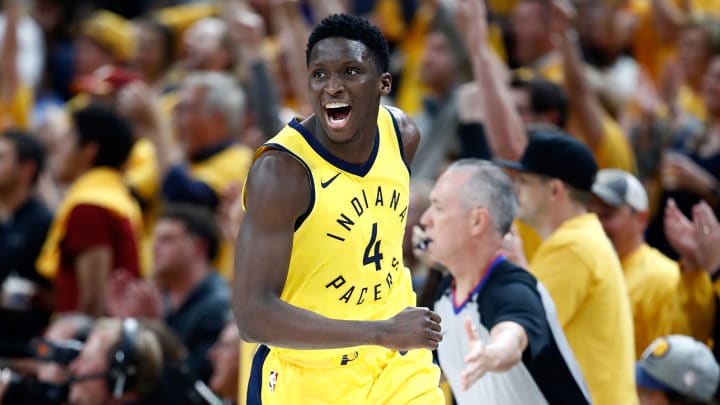Victor Oladipo and the Pacers Have Cleveland on the Brink of Disaster

INDIANAPOLIS—Victor Oladipo made clear his thoughts on the Cavaliers when he sliced open their defense and attempted to dunk LeBron James through the rim. That he missed his attempt only reinforced the thought, because just a few minutes later, Oladipo returned through the same gaping wound in the coverage to finish what he had started.
Wow, they moved the Dunk Contest to April 27? That's crazy😤pic.twitter.com/hyYuQzg9N4
— The Crossover (@TheCrossover) April 28, 2018
The Pacers did not approach Game 6 and their potential playoff elimination with, as goes the Popovichism, an “appropriate fear” of the defending Eastern Conference champions. They came to it with unbridled audacity. Having seen Cleveland's current limitations in vivid color through the first five games, Indiana returned home as a team that knew better than to be daunted. “I believe we were confident even before the series started,” Oladipo said. “And we’re still confident now.” That may have something to do with the fact that these young Pacers absolutely smoked the Cavs, 121-87, to send a wild first-round series to its ultimate decision point: a climactic Game 7 that James and his teammates hadn't bargained for.
There is an eminently real possibility that the best player in the league could see his season end on Sunday—nearly two months ahead of schedule. For nearly a decade, LeBron's presence in the NBA Finals was something close to preordained. Every challenger was dispatched, and most eventually dismantled. Contenders came and went in the West, but the East belonged to James.
This season is different, in large part because of what the Pacers know now to be true: these Cavaliers are fatally flawed. Gone is the team that could overwhelm even quality competition. Everything good and sustainable about Cleveland's play seems to run through James, a weight that's all too apparent on nights like this.
By pestering Jose Calderon and Jordan Clarkson as they brought the ball up the floor, the Pacers made James into the chaperone of Cleveland’s offense. It became standard for possessions to begin with the ball in his hands and an entire defense loaded up to stop him. "I just hate when LeBron has to bring the ball up all the time," Cavs coach Tyronn Lue admitted postgame. One can easily see why. As LeBron progressed through his options from the top of the floor, he found Kyle Korver smothered by overplays, Kevin Love banged up and ineffective and a cast of shooters concerningly still. James made every effort to keep Cleveland’s offense bustling and diverse, but what activity the Cavs mustered went nowhere. Rarely—if ever—has a LeBron-led offense looked so toothless.
LeBron James: Kevin Love ‘Has to Step Up’ for Cavs to Avoid First-Round Exit
"We’re not really focusing on the Cavaliers of the past," Pacers coach Nate McMillan said. Nor should they be; unlike those previous teams, LeBron doesn't have a single teammate who should be treated as a credible threat to create. Cleveland can only endure so many failed post-ups and contested jumpers before James assumes all the responsibility himself.
The Pacers, by contrast, unlocked Oladipo specifically by taking the ball out of his hands. "Everything didn’t have to be a pick-and-roll," Indiana's All-Star guard said of his showing in Game 6. Rather than drive headlong into the same traps he had seen for five straight games, Oladipo waited in the wings to attack the Cavaliers sideways—an adjustment that bore a 28-point, 13-rebound, 10-assist triple double. Cleveland had no such option. Even without committing any overt double teams (which run counter to Indiana's defensive principles), Indiana has held its own against James while neutralizing every possible outlet.
James is not one to endure that sort of frustration quietly. As Indiana's lead ballooned from the teens into the 20s, LeBron's direction of the offense grew more demonstrative—almost perturbed. When he came into the backcourt to retrieve the ball after yet another Pacer make, he clapped hard against its leather. James had tried to finesse the offense and he had tried to jump-start it with brute force; his dunk in the first quarter was every bit as ferocious as Oladipo's, if not more so. Yet in his orchestration, James encountered constant, nagging reminders of his teammates' failures to deliver.
One might expect that of J.R. Smith or Jeff Green. Yet at a certain point, the Pacers even stopped switching LeBron's pick-and-rolls with Love. After all: What was the worst that Love—a 30% shooter in the game and a 32% shooter for the series—could do?
"We try to go to him," James said of Love postgame. "We want to go to him. Obviously, we can’t make the shots for him. He has to step up and knock those down."
This is what Indiana's defense, which at its best stages a full-on invasion of its opponents' personal space, can do a team. It starts with a few turnovers. Then, the trust in the pass begins to erode. Soon enough, all of the wonderful tonality and rhythm of an opponent's offense is stripped away. Complex lines are reduced to a single note. In the end, Cleveland had nothing. The only Cavaliers to join James in double-digit scoring did so in garbage time.
Against the sport's ultimate problem solver, it was the Pacers who had all the answers. There is a truism in the NBA that the ball will find energy. On Friday it found only the Pacers, who pushed at every turn and chased down even the slightest openings to attack. "This," McMillan said, "was going to show our character." Consider it shown. Now comes the pressure to validate it when James and the Cavs, too, have something at stake.
